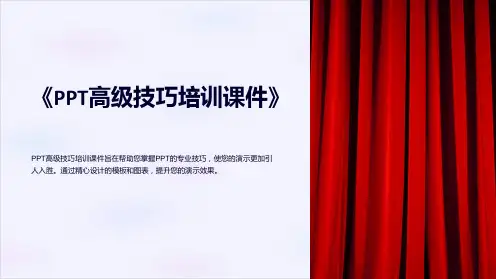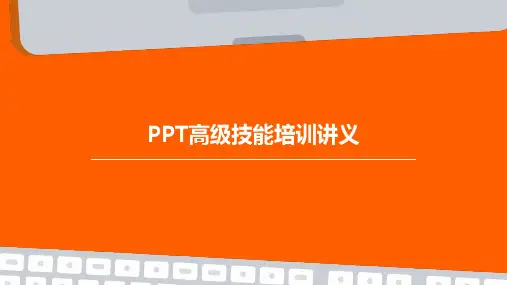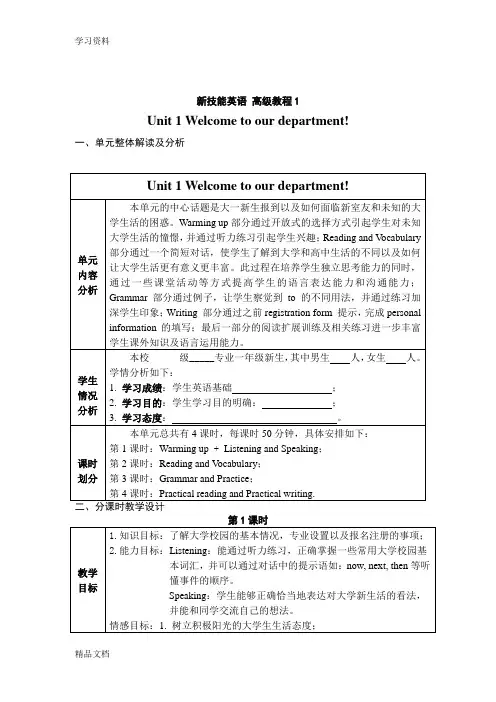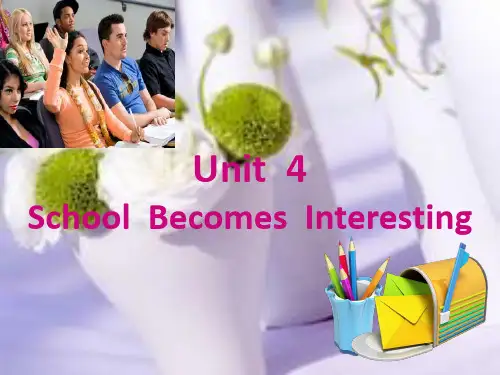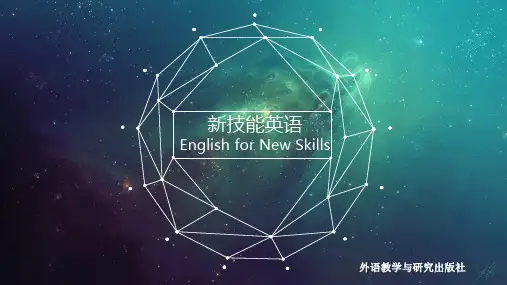新技能高级教程1-U1ppt课件
- 格式:ppt
- 大小:41.26 MB
- 文档页数:83
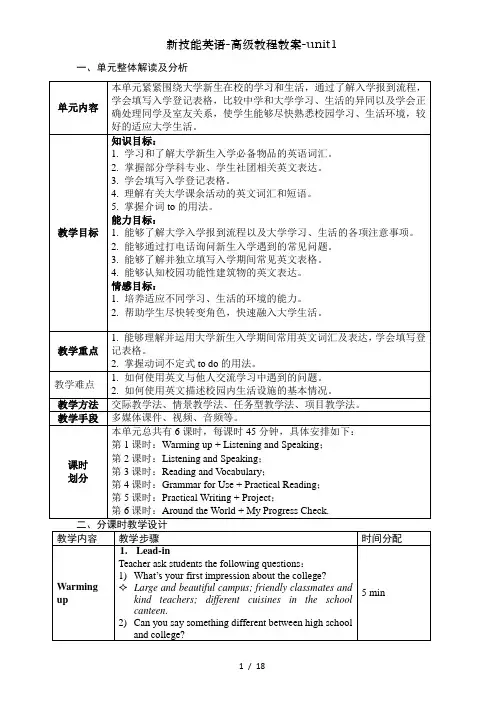
一、单元整体解读及分析1. Background informationE-Commerce: The beginnings of e-commerce can be traced back to the 1960s, when businesses started using Electronic Data Interchange (EDI) to share business documents with other companies. In 1979, the American National Standards Institute developed ASC X12 as a universal standard for businesses to share documents through electronic networks. After the number of individual users sharing electronic documents with each other grew in the 1980s, in the 1990s the rise of eBay and Amazon revolutionized the e-commerce industry. Consumers can now purchase endless amounts of items online, both from typical brick and mortar stores with e-commerce capabilities and one another.2. Word attack1) registration n. the act of entering on an official list. 注册e.g. Kindergarten registration begins today.2) major n. the main subject studied by a college or university student. 主修科目e.g. He chose history as his major and French as his minor majors.What was your major in college?3) fill in supply with information on a specific topic. 填写e.g. The participants were then asked to fill in evaluation forms giving their assessment of the workshop.4) admission notice 录取通知书e.g. With your college admission notice, you can buy train tickets at half-price.3. Useful expressionsAsk for and Offer Help1) What can I do for you?2) May I have your…please?3) I’m here for…4) Excuse me, but could you tell me the steps for registration?5) Is there anything I can do for you?6) Would you mind passing me a piece of paper to write my suggestion on?7) Will you lend me a hand?4. Extensive reading materialsCollege majors:/5. Useful clipsGuide for freshmen1. Background informationCan I change my major?Yes. In fact, studies find that most students change majors at least once and many switch several times. So it might not be a good idea to pick a college only for its program in one major. Instead, consider colleges that offer a range of options that interest you. That way, changing majors won't necessarily require changing colleges, too.If I want to become a doctor or lawyer, do I have to major in premed or prelaw? It might surprise you to know that majoring in premed or prelaw is impossible at almost every college. Premed and prelaw, are not majors. They are special college programs that guide students through the process of preparing for and applying to professional schools, such as medical or law school.So, if you choose to participate in one of these programs, you'll still have to declare a major. Many premed students, for example, major in biology or chemistry. However, as long as you fulfill the admission requirements of the professional school, you can major in just about anything. In fact, professional schools often look for well-rounded students with diverse backgrounds.See the full list at2. Word attack (教师可补充词语的其他常用意思,辅以例句。


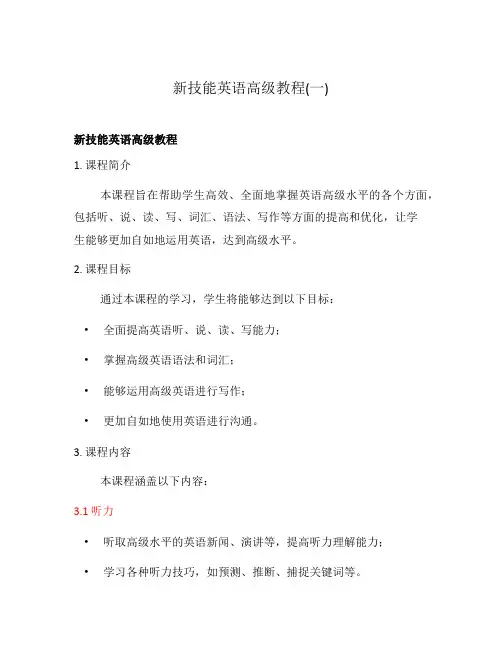
新技能英语高级教程(一)新技能英语高级教程1. 课程简介本课程旨在帮助学生高效、全面地掌握英语高级水平的各个方面,包括听、说、读、写、词汇、语法、写作等方面的提高和优化,让学生能够更加自如地运用英语,达到高级水平。
2. 课程目标通过本课程的学习,学生将能够达到以下目标:•全面提高英语听、说、读、写能力;•掌握高级英语语法和词汇;•能够运用高级英语进行写作;•更加自如地使用英语进行沟通。
3. 课程内容本课程涵盖以下内容:3.1 听力•听取高级水平的英语新闻、演讲等,提高听力理解能力;•学习各种听力技巧,如预测、推断、捕捉关键词等。
3.2 说话•学习高级英语口语和发音;•练习高级英语对话,提高口语表达能力;•学习各种口语技巧,如口语连读、口语节奏等。
3.3 阅读•朗读高级英语文章,提高阅读能力;•学习高级英语词汇和语法,提高阅读理解能力;•分析高级英语文章,提高阅读技巧。
3.4 写作•学习高级英语写作技巧和写作范例;•练习高级英语写作,包括短文、议论文、演讲稿等;•提高写作表达和语言组织能力。
3.5 语法•学习高级英语语法,如时态、语气、虚拟语气等;•练习高级英语语法,加深语法理解和掌握程度。
3.6 词汇•学习高级英语词汇,如同义词、反义词、词根词缀等;•练习高级英语词汇,增加词汇量和掌握程度。
4. 学习方法•每日坚持学习,不断复习;•听、说、读、写并重,注重实践;•多听、多说、多读、多写,提高语感和语音语调;•注意语言学习的机会,尝试和母语为英语的人进行交流。
5. 学习资源•本课程提供全面的学习资料,包括英语新闻、英语文章、视频和音频等;•可以参考其他英语学习资料,如英语学习网站、词典和外教等;•听力和口语训练可通过听力训练软件和线上学习班获得。
6. 学习评估•学生定期进行测试和评估;•定期进行听、说、读、写的模拟练习;•课程结束时进行综合测试和评估。
7. 总结本课程旨在帮助学生整体地提高英语水平和实践能力。
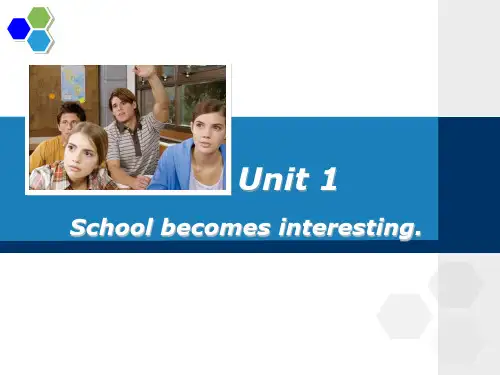
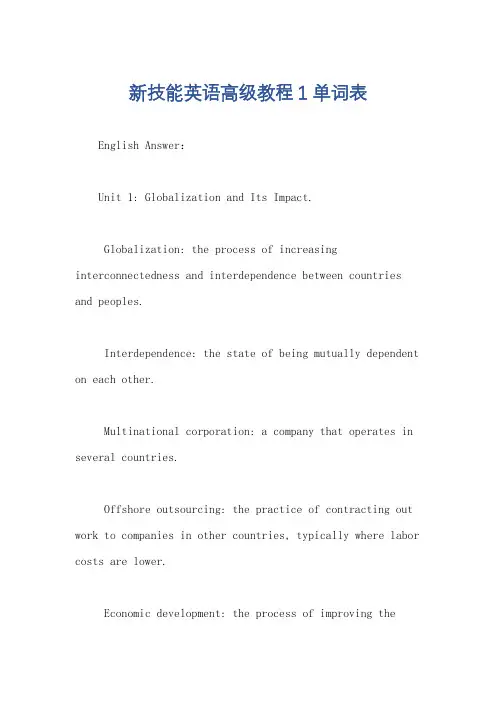
新技能英语高级教程1单词表English Answer:Unit 1: Globalization and Its Impact.Globalization: the process of increasing interconnectedness and interdependence between countries and peoples.Interdependence: the state of being mutually dependent on each other.Multinational corporation: a company that operates in several countries.Offshore outsourcing: the practice of contracting out work to companies in other countries, typically where labor costs are lower.Economic development: the process of improving theeconomic well-being of a country or region.Human development: the process of expanding human capabilities and choices.Sustainable development: development that meets the needs of the present without compromising the ability of future generations to meet their own needs.Unit 2: Technological Advancements.Artificial intelligence (AI): the ability of computers to perform tasks that normally require human intelligence.Blockchain: a distributed database that is used to maintain a continuously growing list of records, called blocks.Cloud computing: the delivery of computing services over the internet.E-commerce: the buying and selling of goods orservices over the internet.Internet of Things (IoT): the network of physical devices that are connected to the internet.Machine learning: the ability of computers to learn without being explicitly programmed.Virtual reality (VR): the use of computer technology to create a simulated environment that can be experienced by the user.Unit 3: Environmental Challenges.Climate change: the long-term alteration of temperature and typical weather patterns in a place.Deforestation: the clearing of forests.Desertification: the process by which land becomes desert.Environmental degradation: the damage or destruction of the natural environment.Extinction: the dying out of a species.Global warming: the gradual increase in the average temperature of the Earth's atmosphere.Pollution: the contamination of the natural environment with harmful substances.Unit 4: Social and Cultural Changes.Cultural diversity: the variety of cultural practices and beliefs that exist in a society.Cultural identity: the sense of belonging to a particular culture.Cultural relativism: the belief that all cultures are valid and should be respected.Globalization of culture: the spread of cultural practices and beliefs across national borders.Intercultural communication: communication between people from different cultural backgrounds.Social change: the transformation of socialinstitutions and practices over time.Social inequality: the unequal distribution of resources and opportunities in a society.Unit 5: Global Health and Well-being.Access to healthcare: the ability to obtain healthcare services when needed.Communicable diseases: diseases that can be transmitted from one person to another.Global health: the health of people around the world.Health disparities: the differences in health outcomes between different groups of people.Non-communicable diseases: diseases that are not transmitted from one person to another.Public health: the science and art of preventing disease, prolonging life, and promoting health through organized efforts.Universal health coverage: the provision of health services to all people, regardless of their ability to pay.Unit 6: International Relations.Diplomacy: the conduct of international relations through negotiation and dialogue.Foreign policy: the policy of a government towards other countries.Globalization of politics: the increasinginterconnectedness and interdependence of political systems around the world.International law: the body of law that governs relations between states.International organizations: organizations that are composed of member states and that work to promote cooperation among them.National security: the protection of a country from threats to its security.War: a state of armed conflict between two or more countries.中文回答:单元 1,全球化及其影响。
